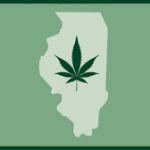 Illinois is expected to be one of the largest retail marijuana markets in the country, and plenty of budding pot entrepreneurs will want to get in on the action and meet consumer demand by opening adult use dispensaries. And if you’re going to legally sell weed to the masses, you’ll have to pass muster with the Illinois Department of Financial and Professional Regulation (IDFPR).
Illinois is expected to be one of the largest retail marijuana markets in the country, and plenty of budding pot entrepreneurs will want to get in on the action and meet consumer demand by opening adult use dispensaries. And if you’re going to legally sell weed to the masses, you’ll have to pass muster with the Illinois Department of Financial and Professional Regulation (IDFPR).
Under the Cannabis Regulation and Tax Act (the “Act”) signed into law earlier this year, IDFPR is charged with implementing and administrating multiple aspects of the state’s adult use marijuana program, including the licensing and oversight of dispensing organizations. Needless to say, IDFPR won’t be passing around dispensary licenses without ensuring that applicants meet the Act’s multitude of requirements and limitations on dispensary ownership and operations.
On a very high level, here is what you need to know before firing up your efforts to apply for a license to open a recreational marijuana dispensary in the Land of Lincoln:
When to Apply
Applications for Conditional Adult Use Dispensing Organization Licenses will be available no later than October 1, 2019, and will be due no later than January 1, 2020. These licenses are “conditional” in that they do not allow the licensee to purchase or sell marijuana until they have found a suitable location (which they must do within 180 days), passed an inspection by IDFPR, and paid the registration fee.
Once these requirements are met, the Department will award the licensee an Adult Use Dispensing Organization License, which authorizes the holder to legally obtain and sell cannabis pursuant to the Act.
Costs of Application and License
The costs involved in applying for and maintaining an adult use license depends on whether or not the applicant is a “Social Equity Applicant.” In an effort to promote and ensure socio-economic diversity and opportunity in the Illinois cannabis industry, the Act provides for reduced fees and other accommodations for applicants from economically disadvantaged areas in the state.
The application fee is $5,000 for Non-Social Equity applicants and $2,500 for Social Equity Applicants. The fee for maintaining a two-year license is $60,000 for Non-Social Equity licensees and $30,000 for Social Equity licensees.
Number of Available Licenses
IDFPR may grant up to 75 adult-use dispensary licenses by May 1, 2020, and up to 110 licenses by December 21, 2021. But the law imposes limitations on the number of licenses IDFPR may issue for each of the 17 Bureau of Labor Statistics (BLS) Regions in Illinois based on that region’s percentage of the state population. The number of available licenses per BLS region is:
- Bloomington: 1
- Cape Girardeau: 1
- Carbondale-Marion 1
- Champaign-Urbana: 1
- Chicago-Naperville-Elgin: 47
- Danville: 1
- Davenport-Moline-Rock Island: 1
- Decatur: 1
- Kankakee: 1
- Peoria: 3
- Rockford: 2
- Louis: 4
- Springfield: 1
- Northwest Illinois Nonmetropolitan Area: 3
- West Central Illinois Nonmetropolitan Area: 3
- East Central Illinois Nonmetropolitan Area: 2
- South Illinois Nonmetropolitan Area: 2
Criteria for Choosing Winning Applicants
There will be a heck of a lot more than 75 applicants for these 75 licenses, so IDFPR will use a point system based on numerous factors to determine who will receive licenses. Those who score highest on the following 250-point scale will be the most likely to be opening dispensary doors next year:
- Suitability of Employee Training Plan (15 points)
- Security and Record-Keeping (65 points)
- Business Plan, Financials, Operating Plan, and Floor Plan (65 points)
- Knowledge and Experience in Cannabis or Related Fields (30 points)
- Status as a Social Equity Applicant (50 points)
- Labor and Employment Practices (5 points)
- Environmental Plan (5 points)
- Illinois Owner (5 points)
- Status as a Veteran (5 points)
- Diversity Plan (5 points)
Ownership Requirements
Not every aspiring dispensary owner will be eligible to receive a license. In addition to being 21 or older, “principal officers” of the business (pretty much anyone with any ownership stake or management authority) must not have been “convicted of an offense that would impair the person’s ability to engage in the practice of owning a dispensary.” IDFPR will use several criteria when evaluating the impact of a principal officer’s previous conviction on their application.
These are just some of the issues involved in applying for and obtaining an adult use cannabis dispensary license in Illinois. While IDFPR may be the body granting licenses, applicants will also have to deal with local governments which will have a big say in whether and where a dispensary can set up shop.
If you are considering entering the legal cannabis industry in Illinois and have questions about the IDFPR application process and criteria, please give me a call at (312) 236-2433 or fill out my online form to arrange for your free initial consultation. I look forward to meeting with you.

